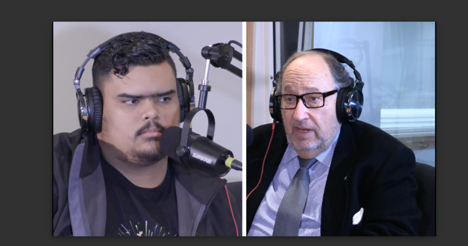When Mark Scheinbaum receives his doctoral hood at the College of Professional Studies’ graduation ceremony this May, he may just be the oldest EdD graduate in the college. 76 years young, Mark has been in pursuit of his doctoral degree off and on for much of his life. It was in part because of the challenges he faced as a first-generation student, balancing the demands of life and family with his educational aspirations, that his doctoral thesis centered on access to higher ed. Specifically, for those who have been historically marginalized.

The result of that research culminated in a documentary video that has subsequently been recognized by several national and international film competitions, most recently winning the Prague International Film Festival for the Best Student Film.
According to Mark, one of the most salient takeaways from his research demonstrated the need to stop minimizing the nuance of individual needs such as intersectionality, language, physical limitations, and financial challenges, and start to listen to the stories that encompass a patchwork of multiple barriers.
This is particularly true in today’s political climate, Mark added, where programs such as affirmative action or DEI initiatives are increasingly under fire.
A resident of Florida, Mark notes that in his home state the misperception around programs such as these center on a wildly incorrect assumption that they represent some kind of “free ticket” at the expense of others.
While some of these programs may open doors to access what may have previously been out of reach for some prospective students, these programs are not a panacea for systemic barriers, It’s so important that people have a much more nuanced understanding of how difficult it is for so many to not just get into school, but finish with a degree.
Mark Scheinbaum
In all of the interviews he conducted with six first-generation students at institutions across different parts of the country, he found that the motivation and inspiration that got them all over the finish line was their ability to dig deep to find motivation, make connections, and build relationships with people who could be a resource for the incredible financial, logistical, and mental load of education while working and caring for a family.
Sitting down with Mark, he shared why this research was so important to him and what he hopes institutions like Northeastern and others will learn from it.

What inspired you to research first-gen students from historically marginalized communities?
I was inspired by the strength and dedication of my fellow first-generation students.
Growing up in New York at a time when first-generation students such as myself often received free tuition at the City University of New York (CUNY) has always inspired me to be a proactive advocate of fighting educational barriers for underserved students. But the monumental shift that took place during the pandemic where we transitioned to online classes was the catalyst for re-focusing my doctoral research in this realm.
Overwhelmingly, my school is first-generation – reportedly the highest percentage in the United States. We were able to craft online study groups, and live video final presentations, and when family and health issues emerged (we had several students whose family members died during the pandemic), we had cohorts do “live intros” to pre-recorded videos or PowerPoint presentations. The bottom line is that the creation of a “pass/fail/incomplete” option by the provost created a demonstrable increase in collaborative efforts, substantive caucus performance, and “fun” with lasting collegial relationships created because every weekly activity was not producing questions of, “What is my grade?” First-generation and international students who are often the only members of their household to graduate from high school, and who feel pressured to “show me your report card,” or answer the question “Why did you only get a ‘B’?” were submitting work products that were superior to the face-to-face class, and certainly, other courses where the instructor would “teach to the test.”
Thus, if the worst pandemic in 102 years could enable first-generation students from a broadly self-identified group of Historically Marginalized Communities (HMCs) to move closer to their bachelor’s degrees, and become motivated to fulfill post-graduate and professional school desires, why not deeply examine the literature and research existing or (sadly) lacking in this investigation?
What most surprised you about this research?
I was most surprised by the six amazing interviewees who recounted—in very specific detail—how self-motivation, superior academic achievement, and myriad variables ultimately motivated them to apply to graduate school. While debate rages about the “fairness” of programs such as affirmative action or DEI, none of these represent any kind of “free ticket” to success. I was really impressed by just how critical it is to examine the intersectionality of language, physical limitations, and financial challenges, and really listen to the complex stories of multiple barriers faced by first-gen students.
What major thing do you think needs to change to make access to higher ed more equitable for all learners?
Top administrators, especially at the graduate and professional level, need to enhance and enrich DEI training, not eliminate the discipline (as in Florida), and actively build bridges with undergraduate programs in Historically Marginalized Community (HMC) recruiting.
Deeper training for advisers and mentors, counselors, graduate school recruiters, and paid and unpaid graduate school marketers organizing “career fairs” or workshops needs to include the broadest definitions of self-identified HMC members. For example, the Nicaraguan woman coming to the United States because her sexual orientation endangered her in her home country; settling in a Brazilian neighborhood in Miami where she had to perfect Portuguese before achieving fluency in English; diagnosed with cancer and unable to afford any health insurance, and attempting to find funds for transportation to dialysis for her mom three days a week, is not defined by a “category.” Graduate and professional schools stereotyping Latinx undergraduates, for example, as best suited for nursing, social work, counseling, dietary and nutritional specialties, no matter what the student’s actual passions for engineering, medicine, or architecture might be, play into historical and systemic barriers, that are the essence of the much-maligned subject of critical race theory.
Anything else you’d like to add?
As an older student, there were moments when financial and family responsibilities, mounting student loans, and an entire summer term missed because of eye surgery, brought me close to quitting. My chair, my GSERA colleagues, and an unexpectedly generous grant from the savior of the entire project: Dr.Karl Reid, and his NU Office of Diversity, Equity, and Inclusion, allowed me to assemble the professional production and post-production talent needed to complete my doctoral research.
I am so grateful for the support I received and am invested in identifying ways that I can take what I have learned to reduce the burden and barriers for graduate education for more HMC members.